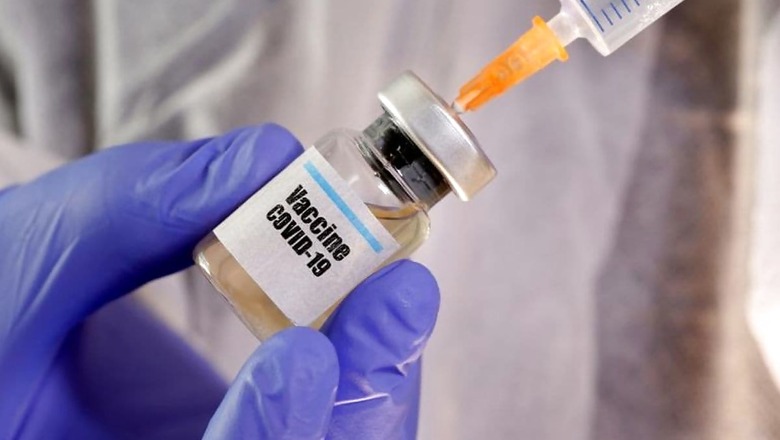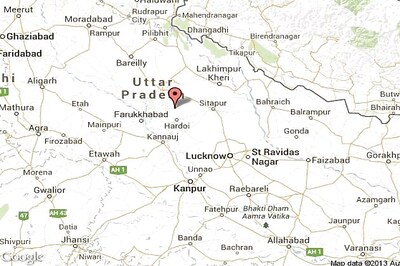
views
People might have to take a third vaccine dose to protect themselves against the coronavirus disease (Covid-19) in future, but there is no “concrete data” at this point, All India Institute of Medical Sciences (AIIMS) director Dr Randeep Guleria has told CNN-News18 in an interview.
He said the possibility of a third dose would hinge on two factors: how long the immunity triggered by the existing two-dose vaccines would last and if new variants would result in vaccine efficacy coming down.
In the interview, Guleria, a member of India’s national task force against Covid-19, also spoke on how long the devastating second wave could last, when the pandemic may come under control, why it is important to vaccinate children, and if beneficiaries can take two different vaccines as part of the two-dose regimen.
On the need for a third booster dose, he said “we may be moving in that direction as far as Covid-19 is concerned”, citing recommendations by doctors in many cases for an annual vaccine against the common influenza.
“…We don’t have concrete data. But I do feel that we may need to take another shot at some point in time. May not be very early but later on,” Guleria said.
This will depend on “how long the immunity of the current vaccine will last and whether it wanes” — which could in turn increase chances of reinfection and call for a “booster dose”, he added. The second factor would be whether newer variants causing “vaccine efficacy to come down” emerge in the coming months.
“…because of that we may need to take a vaccine which has been modified or tweaked to some extent to cover for emerging variants. So this is something that we will have to see in the coming months,” Guleria said.
A debate has begun over how the pandemic could change its course with the emergence of newer variants and whether a third booster dose is necessary. As pointed out by Guleria, scientists say though a possibility cannot be ruled out, there is not enough data to reach an immediate conclusion.
Combining two vaccines
Guleria said the medical fraternity was awaiting data on whether two vaccines could be used by the same beneficiary for first and second doses. The data should be out very soon based on the studies in the UK that are looking at using Oxford-AstraZeneca’s vaccine in combination with Sputnik V and the Pfizer-BioNtech vaccines as far as the two doses are concerned.
Guleria said the argument in favour of such a move was based on the hypothesis that “maybe if you are giving two vaccines which are on different platforms, you may get a better immune response than what you would get by taking the same shot again”.
“We don’t have enough data right now. So the current recommendation is to stick to the same vaccine as far as the second shot is concerned,” he said. If, however, such a move is proved to be useful, it will allow doctors to “play around” with vaccine doses and vaccinate people with “combinations that we could use”, he added.
The second wave
Guleria said he thought “the pandemic is moving from west to east”, commenting on how the second wave of the disease that has sent the infection count spiralling and put stress on the country’s health care system was behaving.
“We have seen that cases in the western part of the country have now sort of plateaued and may start coming down. Central India is still having cases coming up. But I think, hopefully by the second half of this month, we should start seeing stabilisation in cases as far as central India is concerned,” Guleria said. He cautioned that “we may see a rise in cases in the eastern part of our country”.
“And then that will also come down gradually. So, hopefully, we should see a decline in the pandemic in let’s say one-two months.”
He stressed that if India was able to vaccinate a large number of people after that and follow Covid-appropriate behaviour, a possible third wave might be much weaker.
“(if) we are careful in terms of the activities that we do, then the third wave, if it comes — during I will say the end of the year — it will not be as strong (as the second wave) and I am confident that it will be a small wave,” he said.
Guleria said the number of cases will hopefully be under control by next year and normalcy could start returning in our day-to-day lives. “…we will have a large number of people vaccinated and, therefore, we will be gradually coming back to life as we knew it in the pre-Covid era, (but) with a lot of restrictions to begin with.”
Vaccination for children
“We already know that children are a vulnerable population…there’s some talk that if we have another wave, it will hit children hard because they are the susceptible ones who would not have been covered by either the vaccine or natural immunity,” Guleria said.
He added “it’s really important for us to look at how can we protect children” and “one of the most important ways of doing that is by vaccination”.
Guleria pointed out that trials were underway in India and that manufacturers were looking at vaccines for children. “So I am hopeful that in the coming few weeks we will get data which will allow us to vaccinate young children too, and thereby…protect them from subsequent Covid-19 infection,” he said.
Read all the Latest News, Breaking News and Coronavirus News here. Follow us on Facebook, Twitter and Telegram.


















Comments
0 comment